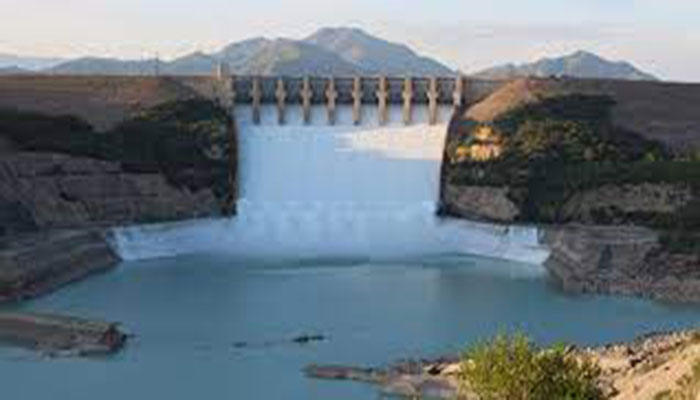Irsa, Sindh at daggers drawn
ISLAMABAD: Sindh’s representatives Thursday walked out of the Indus River System Authority (IRSA) advisory committee meeting in protest alleging that the body had made up its mind to hold the Water Apportionment Accord 1991 and Irsa Act in abeyance to implement the three-tier formula for water distribution among the four federating units during the Rabi season.
The committee meeting — headed by the Punjab Irrigation Secretary Saif Anjam, who is also Chairman of the Authority — ended with no decision. Another meeting will now be held on Oct 5.
Thursday’s meeting saw a heated debate on enforcement of the three-tier formula between Sindh and the Punjab, KP and Balochistan. Sindh sought water distribution for the Rabi season under Para-2 of the Water Accord, saying the three-tier formula was not part of the accord.
It also wanted the advisory committee to abolish exemptions available to KP and Balochistan. The members of the Punjab, Khyber Pakhtunkhwa and Balochistan were of the view that the matter was pending with the Council of Common Interests (CCI) but Sindh refused to accept their viewpoint, saying implementation of the three-tier formula was against the spirit of Water Apportionment Accord and KP and Balochistan must face water shortage when the country faced it. One of the participants from Sindh told The News that they walked out after knowing that the Irsa had made up its mind to enforce the three-tier formula with 28 percent shortfall as was worked by the Irsa's technical committee.
Irrigation Secretary Sohail Qureshi, Agriculture Secretary Abdul Rahim Soomro, Special Irrigation Secretary Jamal Ahmad and Chief Engineer Development Zarif Khhuproo participated in the meeting while representing the Government of Sindh but after 1.30 hours they all along with Sindh Irsa Member Zahid Hussain Junejo walked out.
A top official in the Sindh government, who was part of the meeting, said the Irsa’s decision would damage Sindh a lot being the low riparian province causing a shortage of 5.6maf water worth $5 billion.
“This will injure the main cash crop of wheat in Rabi season and cause a huge dent to the food security of the country,” he added. He said the Sindh delegation remained part of the advisory committee meeting only for one and a half hour and then walked out.
He also argued that the Punjab, KP and Balochistan would benefit from the formula, saying the Punjab would get 8-10 percent more water than its share through the three-tier formula. The Sindh representative also said the three-tier formula was enforced when water availability dipped below 102 million acre feet.
He further said the formula was carved out in 2003 with the aim that it would be applicable only for one year and not for the time to come, as it was not a thumb rule and not mentioned in Water Apportionment Accord and Irsa Act.
“High-level meetings are held to rectify the past mistakes and take the country forward with a consensus, but Thursday’s meeting held the Water Accord and Irsa Act in abeyance and decided to enforce the three-tier formula which is tantamount to breaching the Water Accord.”
Balochistan members in the meeting also registered their protest against Sindh for providing less water of 0.8maf during the Kharif season and demanded the same quantity of water as compensation for Rabi season from Sindh’s share. The meeting could not take up the issue of operational constraints of Tarbela-IV and V hydropower projects.
-
 ChatGPT Caricature Prompts Are Going Viral. Here’s List You Must Try
ChatGPT Caricature Prompts Are Going Viral. Here’s List You Must Try -
 James Pearce Jr. Arrested In Florida After Alleged Domestic Dispute, Falcons Respond
James Pearce Jr. Arrested In Florida After Alleged Domestic Dispute, Falcons Respond -
 Cavaliers Vs Kings: James Harden Shines Late In Cleveland Debut Win
Cavaliers Vs Kings: James Harden Shines Late In Cleveland Debut Win -
 2026 Winter Olympics Snowboarding: Su Yiming Wins Bronze And Completes Medal Set
2026 Winter Olympics Snowboarding: Su Yiming Wins Bronze And Completes Medal Set -
 Trump Hosts Honduran President Nasry Asfura At Mar-a-Lago To Discuss Trade, Security
Trump Hosts Honduran President Nasry Asfura At Mar-a-Lago To Discuss Trade, Security -
 Cuba-Canada Travel Advisory Raises Concerns As Visitor Numbers Decline
Cuba-Canada Travel Advisory Raises Concerns As Visitor Numbers Decline -
 Anthropic Buys 'Super Bowl' Ads To Slam OpenAI’s ChatGPT Ad Strategy
Anthropic Buys 'Super Bowl' Ads To Slam OpenAI’s ChatGPT Ad Strategy -
 Prevent Cancer With These Simple Lifestyle Changes
Prevent Cancer With These Simple Lifestyle Changes -
 Air Canada Flight Diverted St John's With 368 Passengers After Onboard Incident
Air Canada Flight Diverted St John's With 368 Passengers After Onboard Incident -
 Experts Reveal Keto Diet As Key To Treating Depression
Experts Reveal Keto Diet As Key To Treating Depression -
 Inter Miami Vs Barcelona SC Recap As Messi Shines With Goal And Assist
Inter Miami Vs Barcelona SC Recap As Messi Shines With Goal And Assist -
 David Beckham Pays Tribute To Estranged Son Brooklyn Amid Ongoing Family Rift
David Beckham Pays Tribute To Estranged Son Brooklyn Amid Ongoing Family Rift -
 Jailton Almeida Speaks Out After UFC Controversy And Short Notice Fight Booking
Jailton Almeida Speaks Out After UFC Controversy And Short Notice Fight Booking -
 Extreme Cold Warning Issued As Blizzard Hits Southern Ontario Including Toronto
Extreme Cold Warning Issued As Blizzard Hits Southern Ontario Including Toronto -
 Lana Del Rey Announces New Single Co-written With Husband Jeremy Dufrene
Lana Del Rey Announces New Single Co-written With Husband Jeremy Dufrene -
 Ukraine-Russia Talks Heat Up As Zelenskyy Warns Of US Pressure Before Elections
Ukraine-Russia Talks Heat Up As Zelenskyy Warns Of US Pressure Before Elections




